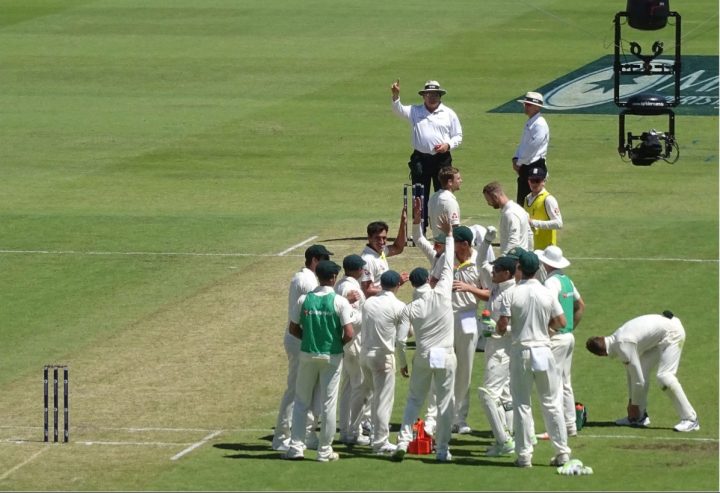
Just because a plan has been successful doesn’t mean that another strategy wouldn’t have worked even better. The foot and mouth outbreak a few years ago was eventually contained, but Tony Blair often had his foot in his mouth during the crisis. Similarly, Australia won the third test at Perth, but that doesn’t necessarily mean they picked the right XI – maybe they would have won by more had they selected their new hero, Usman Khawaja, instead of the nervy Steve Smith?
Unfortunately, the subtlety of this logic seems to have evaded Andrew Strauss. Much as I hate to compare our new national hero to a controversial ex-Prime Minister and the hapless Aussie selectors, the England skipper and Blair have one thing in common: they are conviction leaders. In other words, they do what they do because they believe it is right – and they don’t care if everyone else disagrees with them. Hell, they don’t even care if their decisions defy logic.
Strauss has become infuriatingly stubborn during his tenure as captain – and now that England have retained the Ashes, he seems even more convinced that everything he has done thus far has been right. Therefore, whatever the circumstances, he seems determined to do the same thing again and again. I am, of course, referring to his mind numbingly conservative captaincy.
Actually, ‘conservative’ is too kind a word. After all, ‘conservative’ implies a certain element of orthodoxy. Strauss has been anything but orthodox in this Ashes series. In fact, he’s shredded the book of tactical conventions and donated the remains to Graeme Swann’s cat’s litter tray.
Many of Strauss’ field placings this winter have been plain negative – and they cost England a crucial sixty or seventy runs yesterday; runs which could conceivably cost them the game.
For those of you who value your sleep and didn’t watch yesterday’s action (you sissies), I’ll briefly illustrate why I feel so strongly about this. Australia were 189-8 when Peter Siddle was dismissed. England were on top and there were two new batsmen at the crease: one was Ben Hilfenhaus, the other an out of form Mitchell Johnson. It was the perfect time to attack.
However, instead of trying to get Johnson out – something which hasn’t proved too difficult this series – Strauss immediately set the field back and became ultra defensive. Singles were on offer everywhere Johnson looked – and he hadn’t even reached double figures yet.
Strauss’ negativity took the pressure off the nervous batsmen and sent out totally the wrong signals. The England captain might as well have waved his underpants above his head in surrender before Johnson had hit a single boundary.
The negative fields immediately told Johnson that England were worried about him. It also showed a remarkable lack of faith in England’s excellent attack, who until that point had been all over Australia. To make it worse, Tremlett and Anderson were operating with a new ball that was just three or four overs old. You keep Mitchell Johnson down by getting him out, not giving him a few sighters and raising his confidence.
Heaven knows what our bowlers were thinking, but I know what I was. So did my two cats – one of which got kicked up the jacksie; the other one is a bit more wily these days and has learned to hide under the dining room table when I start muttering ‘Strauss you plonker’!
Nocturnal people like me have witnessed similar tactics throughout the Ashes. In Australia’s second innings at Melbourne, England had just one slip when the score was 50-0. The Aussies were still an unbelievable 380-odd behind at the time.
The partnership was only broken when Watson inexplicably ran out his partner – something which had little to do with scoreboard pressure as runs were coming at an acceptable rate beforehand. However, I got the feeling that Strauss somehow felt his negativity had been vindicated.
The bottom line is that England’s captain needs to be more flexible. He is too obsessed with pre-conceived plans. As we said after Brisbane, England’s sole strategy is to sit in the game and wait for Australia to make mistakes. For the duration of this series, the hapless Aussie batsmen have obliged. But what happens when they don’t? A captain needs to sense the right moment to change tact.
At lunch on the first day of this test, Sky showed an in-depth interview of Strauss with Nasser Hussain in which he tried to defend his conservative tactics. The England skipper was about as convincing as Ricky Ponting’s new wig.
Strauss basically claimed that the so called ‘conventions’ of the game had a lot to answer for – and that his methods had been vindicated by England’s retention of the Ashes.
By dismissing the orthodox approach to captaincy, Strauss was essentially saying that he knows better than every other captain who has played the game – including ones that had a far superior cricketing brain to him. Just because Strauss has won the Ashes against the weakest Australian team in living memory doesn’t make him Mike Brearley.
I therefore felt extremely uncomfortable with the England skipper’s performance. Of course, he came across as collected and intelligent – as he always does – but it’s important not to get fooled by someone’s natural charm (Tony Blair anyone?) and analyse what he actually says.
Although Strauss said everything with a smile, his responses to Nasser’s questions were intransigence personified. The problem with intransigence is that it’s often a sign of pig headedness and a lack of intuition – or, as I fear in Strauss’ case, of both.
Strauss has done a lot of good things since he became England captain. The players respect him and he’s become an authoritative and unflappable figure. However, until he learns to listen to criticism and adapt to circumstances, he will never be a top class international captain.
Like Ricky Ponting, Strauss is currently an excellent leader of men, but a limited tactician.
James Morgan








